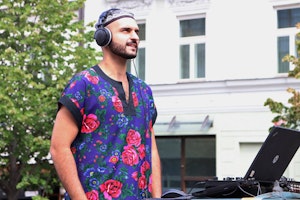Parents of LGBTI Ukrainians Push the Movement Forward
By Gregory Czarnecki

It’s the last Saturday of September and a heavy, muggy heat blankets Kiev in what Ukrainians call babyne lito, or “old woman’s summer.” Fourteen mothers and one grandfather sit in a circle in the cramped offices of Fulcrum, an LGBTI organization. It’s the monthly meeting of Tergo, a support group for parents of gay, lesbian, bisexual, and transgender people.
Olga Storchay, the youngest mother in the room, is attending for the first time. As she plays with the thick blond hair cascading around her shoulders, she explains that her 16-year-old son Nikita came out two years ago.
“I didn’t have time to be sad about him being gay because at his age I just felt like I had to protect him,” she tells the group. “Earlier this year, I decided to assist the Ukrainian soldiers at war in the east as a volunteer, which naturally is a bit risky. On the same day Nikita went to Kiev for the Pride parade.” Olga pauses for a few breaths and continues, tears running down her cheeks.
“I came home safely. Two hours later Nikita returned totally deformed. He had been bashed at Pride so badly his nose was broken. My worst fear had come true.”
In a country more closely associated with political upheaval, Russian military aggression, and far-right nationalism, Ukraine’s LGBTI movement has flourished in the last decade. But with that visibility has come a violent backlash from homophobic and transphobic elements. LGBTI groups like Tergo, founded in 2012, have established themselves as significant civil society activists in post-Maidan Ukraine, attempting to seize a window of opportunity with a new government eager to bolster its Western credentials.
For Olena Globa, who founded Tergo and is also the mother of a gay son, homophobic and transphobic discrimination doesn’t just affect LGBTI individuals themselves.
“Ukrainian society is extremely family-oriented, and in fact our world revolves around children. It’s not like in America where they kick kids out of the home at 18 forever more, or at least as we see on TV,” Olena giggles. “The impact of homophobia and transphobia here is massive on the whole family.”
As Tergo’s profile has grown, so has the number of families seeking their help from around the country. But the organization’s leaders say its mission extends beyond individual support to political advocacy. “We give parents information and courage to speak up in public,” says Olena. “It doesn’t take long—sometimes only one meeting—before they start to say that they want to do something about the extremely homo- and transphobic situation in Ukraine: write letters to politicians, attend demonstrations, or even organize meetings in their own cities.”
For example, a dozen of the organization’s members have bravely participated in a recent photo exhibit [PDF] that simply and poignantly tells their stories. Tergo is also bolstered by the fact that similar groups are popping up all over the region. Earlier this year, Tergo organized its first international networking conference bringing together peer groups from Poland, Malta, Russia, Moldova, and beyond.
As the mothers filter out of the office after the meeting and puff on their cigarettes, I ask Olga about her plans. “Well, I’m actually running for city council in Zaporizhzhia next month, and if I get elected I’m going to offer space in the city hall to host such meetings,” she tells me.
“In the meantime, I still spend a lot of time volunteering with the soldiers, who often are very homophobic. Next time, just let them try to tell me my son is somehow worse than they are. Let them try.”
Fulcrum is a grantee of the Open Society Foundations.
Greg Czarnecki is the LGBTI program officer of the Open Society Human Rights Initiative.


